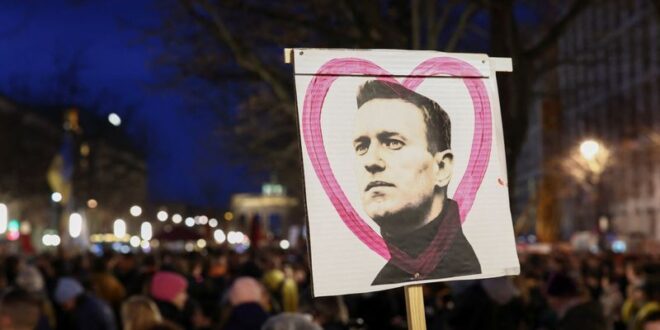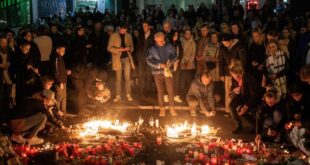PARIS/BERLIN (Reuters) – Hundreds of protesters gathered in European cities on Friday to express their outrage over the death of Kremlin critic Alexei Navalny, chanting slogans critical of Russian President Vladimir Putin whom many blame for the activist’s death.
In Berlin, a crowd of 500 to 600 people, according to police estimates, gathered in front of the Russian embassy on the city’s Unter den Linden boulevard and chanted “Putin is a killer” in a mixture of Russian, German and English.
Some also chanted “Putin to the Hague”, referring to the international criminal court investigating possible war crimes committed in Ukraine.
Police used barriers to close off the road between the embassy and the crowd.
“Alexei Navalny is the leader of the Russian opposition and we always kept hope in his name,” a Russian man draped in a blue-and-white anti-war flag said.
Giving his name only as Ilia, he said he came to Germany with his wife Nika two years ago.
“I don’t think that we will go back to Russia, maybe in 10 years, because it’s a very complicated situation,” Nika said.
In Paris, around 100 protesters spontaneously came together close to the Russian embassy. Many held signs that read “Putin murderer”.
“It’s hard for me to express my emotions, because I’m really shaken”, said Natalia Morozov. “Navalny was, at least for us, a glimmer of hope, and now we no longer have hope for the beautiful Russia of the future. Now, we no longer have the hope, this hope has been killed by Putin, like all the other hopes of our lives.”
About 30 people also gathered near the Russian embassy in Rome, including politicians from green, centrist and pro-EU parties, holding banners with messages including “State murder” and “Navalny killed, Putin criminal”.
In the Netherlands, hundreds of people gathered on Amsterdam’s central Dam Square, carrying signs reading “Putin is a killer”, while in The Hague more than a hundred people gathered outside the Russian embassy, Dutch news agency ANP said.
Navalny’s wife, Yulia, was in Munich on Friday where a protest gathering was expected to take place. She earlier told the Munich Security Conference she could not be sure her husband was dead because “Putin and his government… lie incessantly”.
(Reporting by Tassilo Hummel and Yiming Woo in Paris, Rachel More in Berlin, Alvise Armellini in Rome and Bart Meijer in Amsterdam; editing by Barbara Lewis)
 BeritaKini.biz Berita Viral Terkini di Malaysia
BeritaKini.biz Berita Viral Terkini di Malaysia





